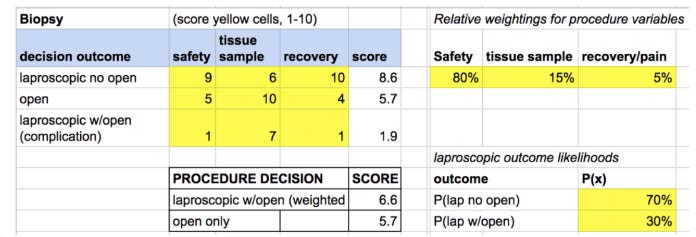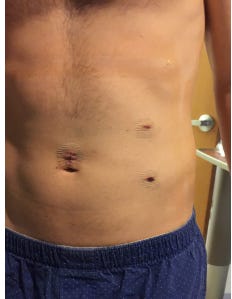A Patient's guide to making surgical decisions
No surgery is small. For example my dad some 20 years ago, had an outpatient, elective surgery to address acid reflux. He picked the first, closest surgeon he found - and trusted his opinion. That was just his way. The result was a week in the hospital followed by an early retirement due to an unforced surgical error (in my dad’s case his vagus nerve was irreparably damaged during the procedure). In a real way it ended his life as he knew it.
He is not alone. Studies about medical errors report that over 250k deaths annually in the United States (U.S)., making medical errors the third leading cause of death. Moreover, error rates are significantly higher in the U.S. than in other developed countries. Under 10 percent of medical errors are reported.
This, of course, is not to say an expert surgeon don’t make mistakes. But it underscores the need to fully understand the factors involved in a decision to bump the odds in our favor.
What I'll do in this post is explain a personal example detailing how I went about a surgery. I’ll walk through the approach I took in the hopes this inspires and equips you to think about your own surgery differently. Put it in your back pocket for when you need it, or share it with a friend that may need it now.
Context
After completing my first round of chemotherapy in 2018 I was given bad news, that the treatment didn't work. The oncologist told me I needed a biopsy to sample the tissue. We needed to understand the population of cells within about 2 weeks to inform next steps.
It turned out the word biopsy was misleading. This was not going to be straightforward. The reason was the tumor location; it was attached to a membrane behind the intestines (called the mesentery), which supplies the small intestine with blood. Injuring this area - even a small nick - could lead to massive blood loss, possibly death.
It was not bad enough that I still had cancer - but now I needed to have a full blown surgery just to figure out my next steps.
Define: what problem do I need to solve?
What I realized right then was I had no idea how to find a high quality surgeon that I'd trust. I say that I’d trust here for a reason. It’s not sufficient to have a competent surgeon - that does not necessarily mean he would have my best interests in mind (the man with a hammer only sees nails).
A few days later I met with the surgeon my Oncologist recommended to discuss the plan. His demeanor struck me as filled with bravado and arrogance. He literally said he wanted to cut me open down the middle, "like a fish". I did not trust this guy.
Assess options (and get scrappy!)
After the consult I walked to the front desk somewhat dejected. The receptionist greeted me and confirmed the time of the surgery early the following week. With the foul aftertaste of that meeting still lingering I had an idea. I asked her: let me ask you something. Is there a surgeon here that you would send your family to if there was some issue? Her eyes lit: oh that would be "doctor so and so". It felt to me like this was a common question! I perked up: oh! is he available? I asked. He'll be off for the holidays later next week but looks like he has a slot next week, she said. Great!
Wow, what a difference. I asked a few questions, for example, is there a way to do this less invasively? He suggested it might be possible to needle biopsy this area laparoscopically using 3 ports: 2 for navigation/cutting, one for visualization. But a needle would poke the tissue blindly too close to that area. So it's probably not worth the risk. If he went in "the old fashioned way" (much better description!), his hands could stem any bleeding manually. Why screw around? The big tradeoff in slicing me open is I'd have a giant scar down my stomach (didn't really care), and 3 weeks of recovery. That would be 3 weeks I could not help my wife with little kids around the house - so I didn't take that lightly. I told him I agreed with his approach and would schedule time to do this.
As I left I kept thinking about this tradeoff. I was increasingly concerned about the burden this would have on my family. A good friend of mine is a trauma surgeon. I texted her to see if we could talk. I described the situation and then asked her if doing something like this laproscopically was possible? Had she seen anyone do this? She told me it is possible, but you'd need someone fairly skilled with these tools to pull it off. He wouldn't want to use a needle, but rather some blunter form of cutting tool. This would reduce the risk of accidentally puncturing sensitive areas. I asked if it would make sense to try first this way, then revert to "the knife" if it didn't work. She agreed it was reasonable, assuming the person was comfortable with the technique.
I built a quick model (below) to ensure I wasn’t missing anything obvious and to convince myself the approach I was considering was sensible.
Without going into the gritty details the quick summary was that I analyzed the various options along 3 dimensions: safety, ability to collect the sample, recovery. I added a third option (lap w/open) that meant the surgeon would start laparoscopically, then revert to open surgery, should (1) complications arise, or (2) if he couldn’t get a good tissue sample, e.g., due to an awkward angle or similar). Based on my numbers the "laproscopic w/open" scenario scored close but higher than just doing open surgery. I basically combined the 2 likely outcomes of laproscopic w/open to derive a single score for the decision to go with this approach.
Validate the approach (feedback or a second opinion)
I validated the decision output was sensible despite the weightings and scoring system being complete SWAGs (scientific wild-ass guess). I did this by shopping this around with my doctor friends to ensure I wasn't missing something obvious (one example would be inclusion of surgeon quality as I really haven’t been able to find a way of assessing this except back-door knowledge through other surgeons and front desk receptionists, which is obviously time consuming and not scalable).
Based on the model outputs I didn't see a strong argument to ONLY do open surgery. I concluded the main way this model could be off is if I had grossly underestimated the risk profile of the laparoscopic procedure, e.g., regarding intestinal damage (which would require a resection) or bleeding, but based on conversations with 2 Kaiser surgeons and one friend who does this kind of thing I felt this was not the case.
Decide and Act
Once I felt comfortable with the model I requested a call with the second surgeon.
Incredibly he was open to the plan! So we aligned on starting laparoscopically with an option to go open surgery. I was amazed that he had the humility and was open-minded enough to work with me on this.
To cut the story short, the surgery was successful going the less invasive path! The surgeon was able to get exactly what he needed without gutting me like a fish. He even complemented me after for doing the work to push for this path. I was up and walking the next day (albeit on pain killers).
The best part? I was able to lift and squeeze the little people you see below before I had to consider my next treatment decisions.




Glad to hear the surgery went well, Ari! And thanks a lot for your openness to sharing this experience. While I applaud your efforts to try to bring structure and logic into healthcare practices (I am wired the same way), if there's one thing I have learned being surrounded by healthcare professionals & having had some challenges in our own family, it is that logic doesn't always work. I do agree with your thinking around validating assumptions and asking for second (third or even forth opinions, esp when stakes are as high as the ones you shared) -- that's something I do too. And once one's mind is set on the approach, put faith in someone to proceed.
BTW, nice tip with asking the receptionist for her recommendation in the manner that you did. Hopefully I don't have to ever be in a similar situation, but if I do, I will def. use that.
A hugely helpful post. Thank you! It shows that we must research options and remain our own advocates. I'm glad your method worked. And I'm sorry about how badly botched your dad's surgery was.